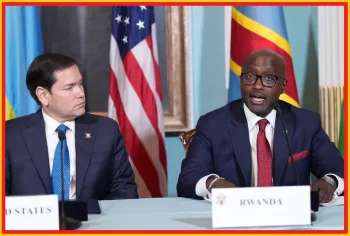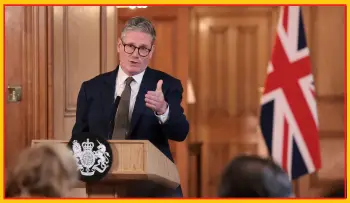Labour Government Ends Rwanda Deportation Plan:
LONDON – One of the most controversial immigration policies “Rwanda Deportation Plan” of United Kingdom has been officially scrapped by the Prime Minister Keir Starmer. Prime Minister of UK termed it “a costly failure” that never delivered what it promised.
PM has scrapped this policy immediately after Labour’s landslide win. This historic decision signals a sharp break from the tough immigration stance of the former Conservative government. Addressing the public from Downing Street, Prime Minister Keir Starmer said the plan had failed in practice and clashed with the values of the country. He further stated that this “It didn’t work. It cost the taxpayer hundreds of millions and undermined our legal and moral obligations,”
🧳 The Backstory: What is the Rwanda Plan?
The Rwanda Plan was initially introduced in 2022 under Boris Johnson’s government. The policy was designed to relocate certain refuge to Rwanda, who entered the UK through irregular routes. Main objective of this policy, was to discourage the destructive Network involved in human trafficking.
But this policy couldn’t forwarded even a single step and even a single flight of refuge couldn’t took off. The then Government faced criticism, Court challenges, widespread backlash and strong opposition from human rights bodies including the United Nations. Although the policy never got off the ground, it still ended up costing British taxpayers hundreds of millions in preparations and contractual agreements.
Critics, opponent and various communities including Indian and South Asian communities across the UK felt this policy as a political stunt rather than a real solution of burning/necessary issues on the ground.
🚨 Why Rawada Plan has been cancelled?
In their first move the Starmer’s government has scrapped the Rwanda Plan. It had grown into a clear example of political posturing that offered little in terms of real, workable policy. The present UK government has now promised a new approach to immigration focused on under mentioned points:
- Strengthening UK border enforcement
- Working with EU partners to stop trafficking routes
- Processing refuge privileges faster and more transparently
- Targeting criminal smuggling operations directly
The goal, they say, is to restore public confidence without abandoning fairness or compassion.
💬 Public Reactions over this step
Human rights advocates have welcomed the U-turn, calling it long overdue. “This is a win for human dignity,” said one legal expert quoted by the BBC. Meanwhile, some Conservative MPs blasted the decision, warning it could lead to a surge in illegal crossings. Critics argue Labour has no real alternative yet—just promises. The Rwandan government, which had signed a lucrative deal with the UK, has asked for official talks to clarify the future of that agreement. Labour says it will review where the money went and whether anything can be reclaimed or redirected.
🌍 Why this Matters was a global concern
For many watching around the world, including in countries like India where migration and diaspora relations are closely followed, this marks a significant pivot in how Britain handles immigration post-Brexit. The Starmer government is now under pressure to balance strong border control with humane policymaking—something no UK government has fully achieved in recent years.The public mood is clear: people want order, but they also want fairness. And how Labour manages that balance could define its credibility for years to come.

🧾 Conclusion
By shelving the Rwanda deportation plan, Keir Starmer hasn’t just ended a policy—he’s set a new tone for how Britain deals with immigration. The challenge now is to back words with results.
Real reform takes more than soundbites. If Labour wants to prove it’s serious, it will need to build a system that works—not just politically, but morally. In this early move, there’s hope—but also a long road ahead.
❓ Frequently Asked Questions (FAQ): UK’s Rwanda Deportation Plan
🔹 Q1. What was the Rwanda Deportation Plan?
A: The Rwanda Deportation Plan was a policy introduced by the UK’s former Conservative government in 2022. It aimed to send certain asylum seekers who arrived in the UK through “irregular routes”—such as crossing the English Channel in small boats—to Rwanda for processing and potential resettlement.
🔹 Q2. Why was the plan introduced in the first place?
A: The Conservative government said the goal was to deter illegal migration and stop human smuggling across the Channel. They argued that tough measures were needed to discourage dangerous crossings and relieve pressure on the UK’s asylum system.
🔹 Q3. Did the plan ever get implemented?
A: No. Despite significant media coverage and financial investment, the plan faced numerous legal challenges and public opposition. No deportation flights ever took off, and the policy remained stalled in the courts until it was officially scrapped by the new Labour government.
🔹 Q4. Why did Labour cancel the policy?
A: Prime Minister Keir Starmer described the Rwanda plan as “unworkable, unethical, and a waste of taxpayer money.” Labour views it as a political stunt that failed to address the root causes of illegal migration.
🔹 Q5. What will Labour do instead?
A: Labour has pledged to develop a more effective and humane immigration policy. Their plans include strengthening UK border enforcement, working with European partners, accelerating asylum processing, and cracking down on human trafficking networks.
🔹 Q6. How much did the Rwanda plan cost taxpayers?
A: While official figures vary, reports suggest the UK government had already paid Rwanda hundreds of millions of pounds as part of the agreement—despite no deportations taking place. Labour says it will review how the money was spent and try to recover or repurpose unused funds.
🔹 Q7. How did Rwanda respond to the cancellation?
A: The Rwandan government has requested formal talks with the UK to discuss the status of the agreement. They were a key partner in the deal and may seek compensation or clarification on financial commitments.
🔹 Q8. What was the public and political reaction to the scrapping?
A: Human rights groups welcomed the move, calling it a win for ethical policymaking. However, some Conservative MPs criticized Labour’s decision, warning it could send the wrong message to people smugglers and increase illegal crossings.
🔹 Q9. Is this the end of deportation-based migration policies in the UK?
A: Not necessarily. While Labour has ruled out the Rwanda model, they haven’t dismissed all forms of immigration enforcement. The focus is shifting toward tackling traffickers and improving processing rather than mass deportation.
🔹 Q10. How could this affect the broader immigration debate in the UK?
A: The end of the Rwanda plan could reshape the national conversation around immigration—moving it from fear-based deterrence to system-based reform. Labour’s approach will be closely watched to see whether it can balance border control with compassion and legal accountability.




